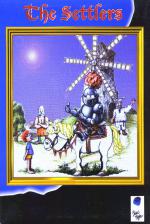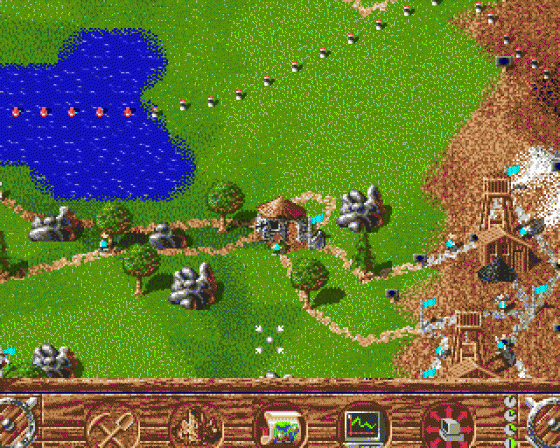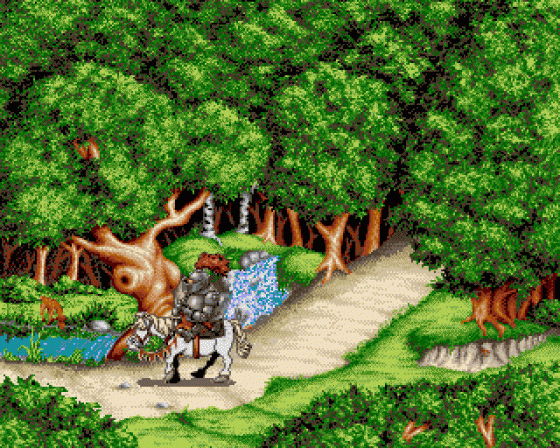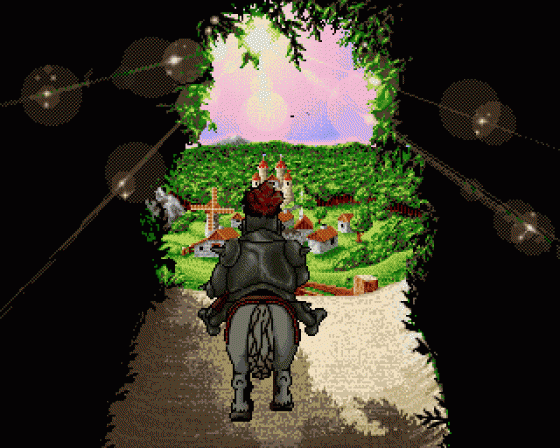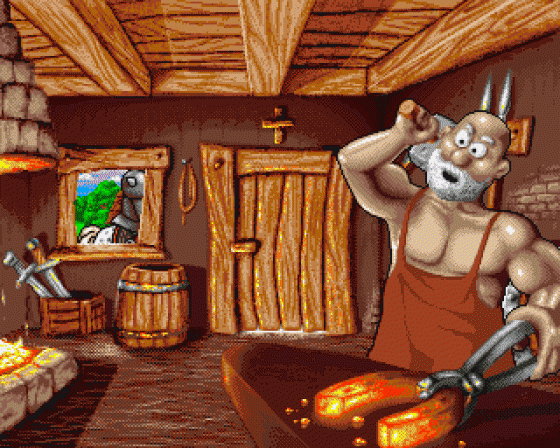
Amiga Power
 1st December 1993
1st December 1993
Categories: Review: Software
Author: Cam Winstanley
Publisher: Blue Byte
Machine: Amiga 500
Published in Amiga Power #32
The Settlers
Straight from Germany, it's an economic strategy sim that looks good and is also great fun to play. Don't settle for anything less.
Warning, warning, you are about to read a review about a strategy game. If you are offended by words such as 'thoughtful', 'in-depth', 'economic simulation', 'long-term progression', or whatever, then *close the magazine now*. This is not, repeat not, a cutesy platform game.
Right then, that should have got rid of all those who are never ever going to be into a game that takes several hours to play, so I guess all of you that have made it thus far are potential buyers. There are lots of games that The Settlers reminds me of, as it looks like Populous, plays a bit like Sim City, and the way that the characters look so terrible in screenshots but come to life when you see them moving around their domain is reminiscent of Lemmings. Yup, The Settlers is like lots of things, but still manages to be a unique game, which is truly a rare and satisfying thing to see these days.

The idea of the game is to take over the entire land, which not only involves building up your own little stable economy, but also kicking your enemies off their turf, like you do in Populous. Conquering in Populous was a messy affair that involved burning, drowning or just plain hacking up your enemies but things just aren't that nasty in The Settlers. The tone of the game is set by a cartoony intro sequence which shows a fat knight on a roly-poly pony wandering through a happy little village, and after that it would seem almost sacrilegious to portray violence. The fact is that no-one gets killed in the game, vanquished settlers wander home, and battling knights just get their armour dented. I suppose it makes a change after the carnage of games like Syndicate.
To start a kingdom, you've first got to place your castle somewhere in the land, which in itself is a skill. The ideal spot would be one that's near a lake for fishing, near some mountains for mining, next to some trees for building materials and is flat enough to allow lots of space for building, but it's always a compromise. The castle acts as the seed for your kingdom, with enough settlers, food and building materials to get started, and markers showing your territory boundary.
To build something you just click on a spot, and then click on the building of your choice. This lays the foundations, but nothing happens until you link the building site up to the castle with a path, at which point lots of little guys pour out of the castle. There are 25 different settlers in the game, so first you'll see a joiner heading out, who'll then be met by a construction worker carrying wood. You then have to busy yourself doing other tasks as the wooden framework gets erected and the house is built in real time.

It isn't hard to stay busy, as you've got to plan your entire civilisation. Farms need to be built to produce grain and livestock, windmills and bakers produce the bread and even butchers are needed to prepare meat. Come to think about it, the little oinky piggies are the only victims in this entire game. While you're feeding your workers, it's a good idea to keep them busy, so you've got to make sure there's enough basic building materials to go around - you also need iron and gold to produce tools and weapons.
All this sounds horribly complicated, and I suppose it is, but the beauty of the game is that the data's all supplied in all manner of brilliantly simple ways. The flow of goods through the manufacturing processes is displayed with a series of dials, so if the baker isn't getting enough flour to make bread, his dial will be in the red, and if the builders are getting too much wood, their dial will go green. So, you can optimise the growth of your settlement by building more farms for the grain, and diverting the surplus wood to build boats for the fishermen.
Obviously, you're going to run out of land sooner or later, so your other task is to expand your frontier, which you do by building guard towers at the edge of your territory. When you finally share a border with any of your enemies, then the pillaging and squabbling starts, with knights bashing each other in, and the winner grabbing all the resources of the loser. But no-one gets hurt, remember.
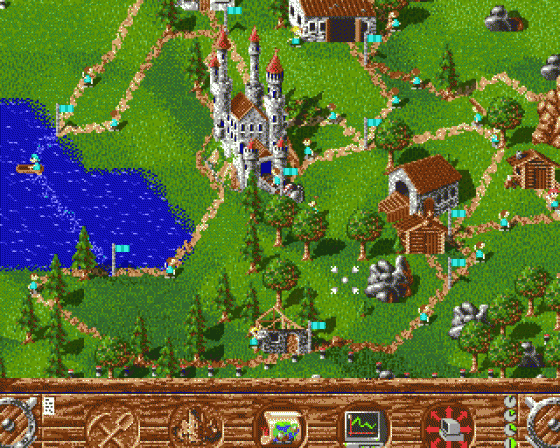
The process of building your domain is fascinating, simply because of the attention to detail. You actually see the crops grow in the fields and the farmers harvest it, and the paths are constantly filled with people delivering goods, waving at each other and walking to work.
This attention spreads over to the sound effects, which vary depending on what's on the screen. If you're in the middle of your land, the air is filled with grunting pigs, the hammering of construction, the sawing of trees and so on, but if you move to some woods all you hear is birdies tweeting. The barren deserts (which are pretty impassable, and therefore good defences) echo to eerie wind noises while the lakes splish and splash gently. It's all quite beautiful.
I found it extremely hard to fault any of this, but before you rush off and buy it, there is one factor that's worth taking into account, and it's not really a criticism, more of a comment. The size of the playing area changes depending on your choice and also on the capabilities of the machine. On an A1200, for example, you can have a playing area made up of 600 screens with up to 32,000 settlers wandering about, whereas the standard Amiga can only cope with 150 screens and 8,000 settlers, which is still enough.

The thing is, the bigger the area gets, the longer it takes to conquer. A mid-sized level can take anything up to six hours to take over, so for a full-sized A1200 map, you're looking at double that time, at least. Now seeing as I once took seven hours to win a battle in Dune 2, this length of time doesn't bother me, and as the game reminds you to save every 30 minutes, you'd have to be a real dead-head to play for hours and then have your Amiga crash on you. Admittedly, there are times when you're glad there's an 'accelerate time' option, but most of the time it's entertaining just to watch everyone go about their business, while you go something else. I think that it's excellent, but I'll also admit that it's a bit of a specialist taste. However, fans of A-Train, Populous and Sim City should head to the shops this instant.
The Bottom Line
Uppers: Witty, imaginative and detailed right down to the last leaf and fishing rod. It's as complex or simple as you want it to be, and thoroughly absorbing.
Downers: It's a bit like a non-stop soap opera on a channel of its very own. Playing it will literally devour days of your life.
The cuteness tends to detract from the epic scale of this game, which will either draw you in totally or leave you stone cold. Events change across hours rather than minutes, but that leaves you plenty of time to explore the complexities of an entire living, growing economy. Hmmm, fascinating.
A1200 Version
You get the option of bigger maps, and more sound effects, giving you that self-satisfied feeling of having something just a bit better and smoother than everyone else.

